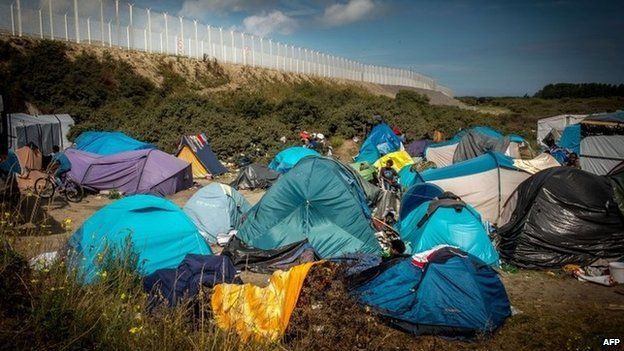Calais migrant crisis: UK and France to sign deal
- Published

UK and French ministers will meet in Calais on Thursday to agree a new deal to tackle the migrant crisis there.
The proposed deal is expected to include more security around the site where thousands of migrants are living and moves to tackle people trafficking.
Home Secretary Theresa May and French Interior Minister Bernard Cazeneuve will tour the Eurotunnel site and meet aid associations helping migrants.
They will also discuss humanitarian support for migrants.
Neither government has given full details of what the deal will involve.
Thousands of migrants are living around Calais - many of them in the camp known as the Jungle - and each night hundreds attempt to reach the UK by breaching security around the port and Eurotunnel.
After the meeting with Mrs May, Mr Cazeneuve will travel to Berlin to meet his German counterpart for talks on Europe's migration policies.
The UK government has offered France help with security around Calais - including £7m for fences - but police there have said such measures are only a "short-term solution".
BBC diplomatic correspondent Paul Adams said the UK government had pledged a total of £20m over the past year to improve security at the port of Calais and the Eurotunnel terminal.
"It's not clear what, if any, new money the government is now offering," he added.
UK Independence Party MEP Mike Hookem said the deal was "too little, too late".
"The migration crisis has spread beyond Calais and cannot be solved by these two countries because it starts in the Mediterranean," he said.
The Calais situation is part of a much larger migration issue in Europe.
More than 240,000 migrants have crossed the Mediterranean already this year, arriving on the shores of Greece and Italy.
Meanwhile, it has been suggested that the number of refugees seeking asylum in Germany could surge to 750,000 this year - and a UN High Commissioner has said more European countries should share the responsibility.
- Published16 August 2015
- Published14 August 2015
- Published12 August 2015
- Published1 August 2015